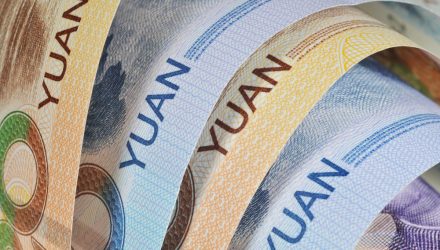Emerging markets bonds languished in 2022 as the U.S. dollar and interest rates soared, but the asset class is seen as a potential rebound candidate in 2023 as some central banks in developing markets back away from rate hikes as inflation cools. Predictably, China looms large in the emerging markets debt discussion.
With some fixed income market observers noting that last year’s headwinds, including real estate sector woes, are in the rear view mirror, exchange traded funds such as the KraneShares Bloomberg China Bond Inclusion Index ETF (KBND) could be worth evaluating this year.
KBND follows the Bloomberg China Inclusion Focused Bond Index and primarily holds Chinese sovereign debt as well as investment-grade corporate bonds, indicating credit risk is relatively tame compared to that of other emerging markets corporate bond ETFs. Speaking of credit risk, it remains a point of emphasis for portfolio managers this year.
“For 2023, we are expecting total returns to be in double-digit territory and for it to be led by the opening of China and the reversal of tight policies there. Again, from both a macro and micro point of view, the outlook faces uncertainties,” noted BNP Paribas head of emerging markets corporate debt, Alaa Bushehri. “These are around the themes of inflation, recession risks, rates, geopolitics and the risk of credits events, whether that is a single name or a sector or a region. We place a very low probability with regards to the risk of a credit event. But we are in EM corporates and that is an aspect that we always have to be on the outlook for.”
As of the end of 2022, KBND held 35 bonds and sported a 30-day SEC yield of 1.95%. That’s not particularly high, but it can be inferred to be a confirmation of quality. Plus, KBND provides access to China’s $13 trillion onshore bond market, which is being increasingly liberalized for international investors.
Not only is KBND an access story, it’s one of shorter duration with the potential for more accommodative monetary policy as China looks to stimulate the world’s second-largest economy against the backdrop of slower global growth.
“So the EM corporates benchmark is now shorter in duration by approximately two years, but it’s better in terms of ratings: it’s investment-grade. EM sovereign are high-yield. Having said that, if we look at relative value, we ended 2022 with corporates slightly outperforming,” concluded Bushehri.
For more news, information, and analysis, visit the China Insights Channel.
The opinions and forecasts expressed herein are solely those of Tom Lydon, and may not actually come to pass. Information on this site should not be used or construed as an offer to sell, a solicitation of an offer to buy, or a recommendation for any product.

